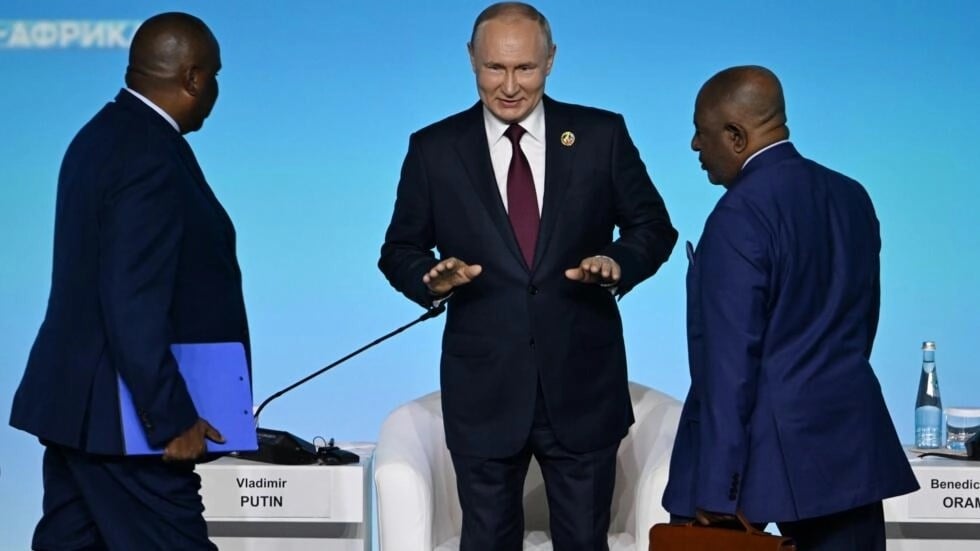Putin vows to provide $90mln to African countries in debt relief
Russian President Vladimir Putin announces Russia is taking part in debt relief efforts for African countries, writing off a total of $23 billion in debt.
-

Russian President Vladimir Putin at the Russia-Africa summit (AFP)
Russian President Vladimir Putin announced during the Russia-Africa summit that his country will provide approximately $90 million in debt relief to African nations.
"Russia is taking part in debt relief efforts for African countries. At the moment, we have written off a total of $23 billion in debt. On recent requests of African countries, we will allocate over $90 million more for these development purposes," Putin said at the Russia-Africa summit.
This is part of Russia's ongoing efforts to support the development of African countries, and it comes in addition to the $23 billion debt that has already been written off. The summit, held in St. Petersburg from July 27-28, is aimed at strengthening ties between Russia and African nations.
Regarding the situation in Ukraine and NATO expansion, President Putin emphasized the importance of resolving conflicts through negotiations. He expressed his concern that the other side is unwilling to engage in talks, and he attributed the conflict partly to security threats from NATO and the United States.
"We are already talking about this, we can still discuss the situation related to the conflict in Ukraine, but we, of course, agree with you that all contradictions should be resolved during negotiations, but the problem is that they refuse to negotiate with us," Putin stated.
"They, I repeat once again, refuse to negotiate on ensuring equal security for everyone, including Russia. And Ukraine itself, or rather the current Ukrainian regime, refuses to negotiate, it was officially announced," Putin said.
South African President Cyril Ramaphosa expressed his hope that aspects of Africa's peace plan on Ukraine would be discussed during his meeting with President Putin. He appreciated the opportunity to present the peace plan to Putin during a previous African delegation's visit in June and looked forward to further discussions on implementing the proposals.
"And we look forward to engaging further with you [Putin] later today to hear precisely how some of those proposals can be taken forward," Ramaphosa said.
Overall, the Russia-Africa summit seeks to foster dialogue and cooperation between Russia and African nations on various economic, humanitarian, and security issues.
The grain deal: Benefit for the rich, impact on the poor
The grain deal facilitated the export of around 33 million tonnes of grain from Ukrainian ports to global markets, including Africa, stabilizing food prices and averting shortages.
However, international watchdogs have repeatedly warned that the lion's share of the food produced was delivered to the West, leaving poor countries combined receiving less than one-third of exports. The UN itself admitted the disproportionality through its coordinator who maintained that developing and impoverished nations received only 10 percent of corn and 40 percent of wheat, while rich countries obtained 90 percent of corn and 60 percent of wheat.
Concurrently, Russian President Vladimir Putin warned that most of the grain exports found their way to the European Union instead of developing countries. Addressing this issue, Putin announced that Moscow is ready to export potash fertilizers to low-income nations, especially in Africa, free of charge
On July 17, Moscow announced that it had "terminated" the grain deal, explaining that it would be resumed once Western countries fulfill their commitments to the deal, which, according to Russia, only benefited Ukraine while sanctions hindered the export and sale of Russian grain and fertilizers.
On July 22, Moscow's deputy permanent representative to the UN reiterated that Russia's decision to withdraw from the grain deal was a result of unaddressed concerns, declaring that Moscow is open to rejoining the grain deal facilitated by the UN and Turkey but under certain conditions. Russia also emphasized that the grain deal should prioritize its original humanitarian purpose, aimed at addressing food issues in developing countries rather than benefiting wealthy nations.
A summit ahead of another
The summit in Saint Petersburg is being held a month before a BRICS summit in Johannesburg. Putin has been invited to the summit and he will take part in every meeting of the BRICS leaders virtually.
Meanwhile, French President Emmanuel Macron was not issued an invitation to attend the activities of the next BRICS meeting, as per a South African news outlet.
The heads of 70 nations received invites to the unification meeting from South African President Cyril Ramaphosa, who is also the chairman of the BRICS, but neither the French President nor the United States or the United Kingdom leaders were included, according to the journal.
This is the third consecutive year that South Africa has held the BRICS presidency. The BRICS chairship will be held by Russia starting in 2024.
Read next: Ukraine trap; EU stuck in old era as Global South crafts multipolarity

 5 Min Read
5 Min Read








